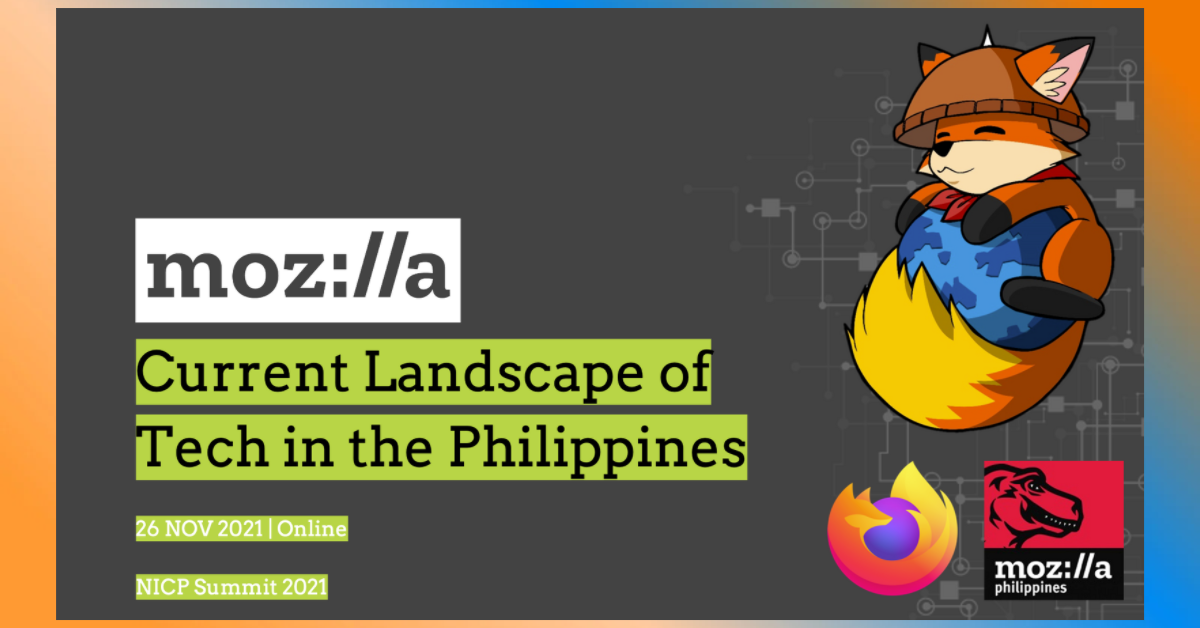Late last month, I was invited to be part of a panel discussion at the NICP (National ICT Confederation of the Philippines) Summit 2021 with their theme, “Accelerating Digital Transformation in Challenging Times.”
Wearing both my hats as a Mozilla Rep and as a Tech News Columnist, the organizers of the annual conference asked me to give a 10-minute introductory talk about the “Current Landscape of Tech in the Philippines” and upon consulting the leadership team of the Mozilla Philippines Community (MozillaPH), the following are the points that I discussed.
Philippine Internet

I, personally, believe that the Internet in the Philippines is not slow. You may laugh when you hear me say that over and over again (I had been telling people in local conferences about this for years now). But I guess you will surely agree when I say that the Internet in the Philippines is one of the most expensive on the planet.
In a 2019 report released by international eCommerce company Picodi.com, the Philippines ranked seventh as the country with the most expensive Internet in the world based on 100 Mbps subscription plans (at US$56.24/mo). Our ASEAN neighbors are way below in the said list: Indonesia (19th at US$44.57/mo), Malaysia (32nd at US$29.08/mo), Singapore (37th at US$21.78/mo), and Thailand (40th at US$20.23/mo).
Right now, we already have three (03) major telcos and quite a number of Internet Service Providers (ISP) — something positive to have, especially during this pandemic when most are working from home and the kids are under homeschooling. Internet penetration, especially using mobile, is still far from what we aspire to achieve — but we are getting there.
During my talk, I also said that the Internet game has changed from “we need FASTER Internet” to “we need a MORE STABLE Internet.” I am pretty sure that even non-gamers will side with me on this.
With the elections fast approaching, we at MozillaPH also noticed that most Filipinos still see the Internet within the realms of Facebook — primarily due to Free Basics or Free FB, as what most call it. Free Basics intended to provide access to communication tools, health information, education resources, and other low-bandwidth services in collaboration with mobile operators.
Digital Inclusion, FinTech, Startups, & Participatory Governance

Did you know that in 2016, Google, Microsoft, DevConPH, and Mozilla representatives in the Philippines sat down and met initially to avoid a clash in staging different tech events in the country and to discuss many things related to (tech) community building? It now grew to a collective organization known as the Philippine Tech Community (PHTechCommunity.org) with more than eighty (80) member organizations meeting on a regular basis to share best practices in building and managing a not-for-profit tech organization.
We (MozillaPH) also saw a dire need for these local tech communities (not just the usual gatekeepers) to be part of the government’s decision-making process.
As a techie, something that irks me is the fact that even most government agencies have their own websites, not all are useful and functioning as expected — not to mention that some government webbies are still using free email services instead of @.gov.ph (which is mandated by law).
Another thing: most government agencies favor proprietary software over Free and Open Source Software (FOSS). Many have this wrong notion that FOSS is inferior and unsecured compared to proprietary software. This kind of thinking by government officials and employees has to change.
On another note, the ongoing pandemic also made a lot of Filipinos adopt FinTech solutions — now, even my parents know how to use GCash and PayMaya to send cash allowances to their “apo” (my child, even if he’s on homeschooling), at least.
Being a tech incubator, we feel that there is a disconnect between Filipino startups and Filipino consumers — Pinoys tend to copy Silicon Valley startups. Nothing is wrong with idolizing Valley-based startups, but the way we see it, most local startups crash out because they failed to cater to the needs of their target market — often, the Filipino consumers.
On Misinformation, Disinformation, & Privacy

The ongoing pandemic brought us to another level in the information age where misinformation and disinformation are something we encounter on a daily basis. With social media being a huge part of our daily lives, it is but easy for people to believe in a lie just like that.
With different kinds of scams, hacking incidents, and data breaches happening daily, Filipinos have fast become aware of their own privacy — both online and in-person. Personally, I am happy when I hear someone invoking his/her rights under the Data Privacy Act of 2012 (RA 10173) — good job, National Privacy Commission (NPC), and to the different organizations promoting and safeguarding the privacy of our fellow Filipinos.
For the new year, I only hope and wish for a better Philippine tech landscape in 2022.


